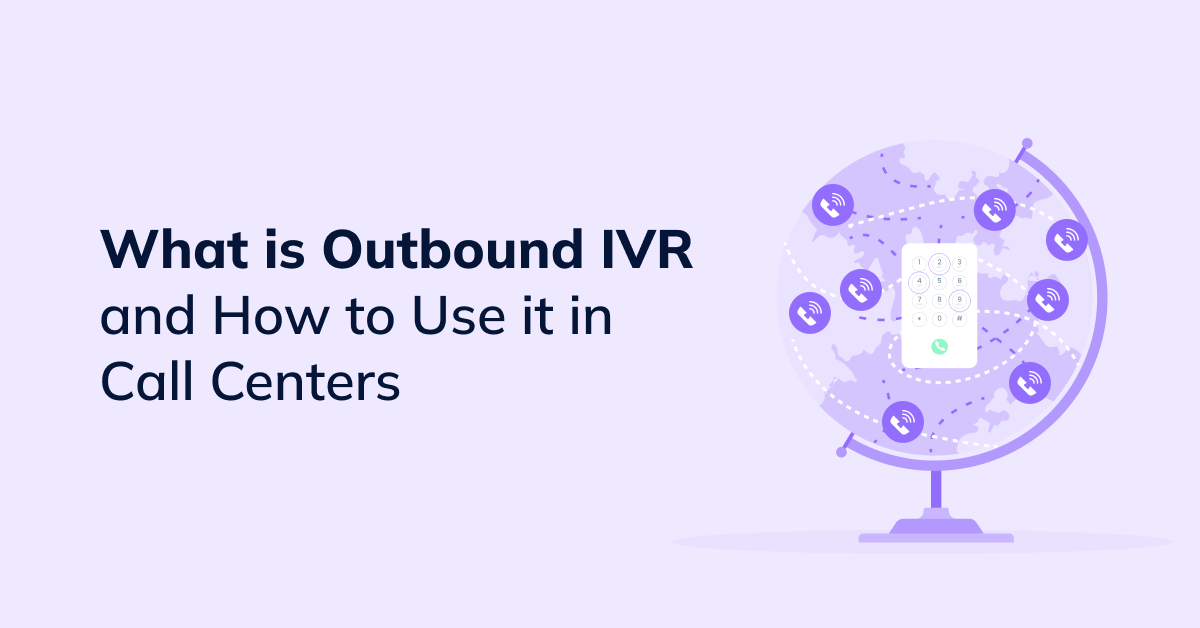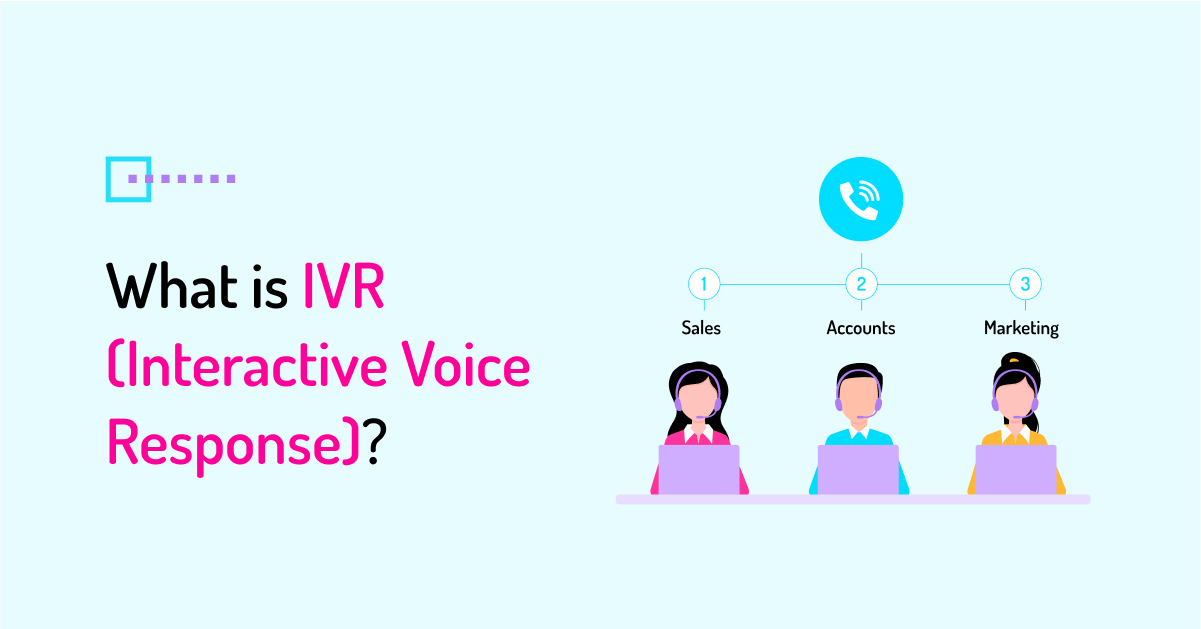Call center agents play a significant role in managing customer communications, maintaining customer satisfaction, and a brand’s reputation by providing customer support, technical assistance, and handling complaints. In today’s call centers, their responsibilities may range from simply answering incoming calls and resolving issues to proactively reaching out to prospects and customers to generate new sales opportunities.
What is a Call Center Agent?
A call center agent, also referred to as a call center representative, a customer service representative (CSR), or a contact center agent, is a person who handles customer calls within an organization. Agents who manage inbound calls are known as inbound call center agents, while those who make outbound calls are known as outbound call center agents. Those who handle both inbound and outbound calls can also be referred to as blended call center agents. They may work in either traditional call centers or remote/ work-from-home environments.
The Importance of Call Center Agents
As a part of a customer service team, call center agents are at the frontline of a business. They are often the first and the only point of contact for prospects and customers who have questions, concerns, or issues with a company’s products. The way agents respond to customer needs, resolve inquiries, and deal with complaints can impact customer satisfaction, customer loyalty, and retention. Outbound call center reps can also contribute to generating leads and increasing sales by leveraging up-selling and cross-selling opportunities.
Roles and Duties of Call Center Agents
Traditionally, call center agents were known for simply placing and receiving customer phone calls. Their roles and functions may significantly vary in a modern call center environment. Based on the industry, the size, and the type of organization, call center agent duties and responsibilities may include:
1. Answering Inbound Customer Calls
Answering incoming customer calls is the primary responsibility of a call center employee at the entry level-position of inbound call centers. When receiving inbound calls, they must provide accurate information about a company’s offerings, answer questions from prospects or current customers, resolve basic issues, and manage account inquiries.
An inbound call center representative may also be responsible for processing orders and payments, resolving billing and payment issues, managing cancellations, shipping, refunds, returns, and warranties, and properly logging customer data after each customer interaction.
To efficiently handle the inbound call volume and deliver an exceptional customer service experience, they should know how to start and end a call, follow call scripts, put a customer on hold, and transfer a call when the customer’s issue needs escalation.
2. Managing Customer Complaints
A call center job requires agents to effectively manage complaints and deal with unhappy customers. Therefore, agents should be trained and equipped to solve customer problems quickly and efficiently and defuse conflicts before they turn into more challenging situations.
Agents must be able to demonstrate excellent listening skills, empathy, problem-solving, and properly apologize. They also should know how to seamlessly escalate the issue to higher-tier support if it cannot be resolved immediately, or if an agent doesn’t have the appropriate skill set or authority.
3. Troubleshooting and Follow-ups
In IT, tech, and SaaS companies, call center representatives can be involved in troubleshooting and resolving technical support issues customers may have with a company’s product or service. That can also include performing diagnostic tests, troubleshooting software installations, and assisting with setting up product features. Since complicated tech issues aren’t always resolved on the first contact, agents may also need to follow up with customers and update them on the progress of their queries.
4. Making Outbound Calls
In outbound call centers, agents initiate calls to leads, prospects, or customers, rather than accepting incoming calls. These calls can have specific purposes ranging from cold calling, telemarketing sales, and proactive support to scheduling appointments, gathering feedback, and conducting market research.
- Lead generation and sales: Agents make large volumes of outbound calls to generate leads or sell a company’s products or services to existing clients.
- Proactive customer service: Agents reach out to customers proactively to address existing or potential issues before they become bigger problems.
- Conducting market research: Agents make outbound calls to conduct market research and gather insights about market trends and consumer preferences.
- Collecting customer feedback: Agents can be responsible for calling up the customers to gather feedback about the products or services they purchased.
- Appointment scheduling: Agents may call potential customers to schedule appointments and events with a business.
- Debt collection: Agents call customers who have overdue payments to negotiate payment plans, collect debts, and resolve other financial disputes.
Most outbound call center operations and agent workflows can be optimized through call center dialing tools such as AI-powered auto dialers. Call center dialers automate the dialing process and enable agents to handle high outbound call volumes while increasing agent talk times and reducing agent idle times.
5. Up-Selling and Cross-Selling
Up-selling and cross-selling are also among the common call center duties. During customer service interactions, agents can encourage customers to purchase a higher-end version of a product or service they are already using (up-sell) or offer a related or complementary product or service (cross-sell). To do it efficiently, professionally, and in a non-intrusive way, agents should have deep product knowledge and be able to communicate its benefits to customers.
Essential Skills for Call Center Agents in Inbound and Outbound Call Centers
Considering the range of duties and responsibilities of call center agents, below are some of the most critical skills and capabilities call center reps should have to succeed in the role.
Deep product/ service knowledge
Based on research from Salesforce, 83% of customers expect to solve complex problems by speaking to one person when they call customer support. A thorough understanding of the company’s products, services, policies, and procedures is essential for call center reps to provide efficient support and resolve issues without passing customers back and forth.
Excellent communication skills
Excellent verbal and written communication are must-have soft skills for customer-facing roles, such as supporting customers on inbound calls or making outbound sales calls. In fact, according to the Global Talent Trends report by LinkedIn, 92% of talent professionals say soft skills matter as much or more than hard skills, which is why they prioritize soft skills alongside hard skills during the hiring process.
It’s also important for call center agents to use positive language and avoid negative statements, especially when an agent is unable to fulfill a customer’s request. In most cases, that can help agents turn a negative customer experience into a positive one, regardless of the outcome of the interaction.
Active listening and attention to detail
McKinsey report revealed that 71% of consumers expect companies to deliver personalized interactions, and 76% get frustrated when this doesn’t happen. While agents can ensure a deeper level of personalization when they have a 360-degree customer view and the context of previous interactions, active listening skills play a crucial role in the agent’s ability to deliver a more personalized communication experience.
On customer service calls, in particular, the first step to ensuring efficient issue resolution is understanding each customer’s specific needs, problems, and concerns. This is where active listening and attention to detail can greatly help.
Empathy
According to research by Hiver, nearly 80% of consumers want customer service to be more empathetic, more responsive, or both. That makes empathy – the ability to understand and relate to other people’s feelings – a critical skill for call center agents, especially those handling customer service calls.
Demonstrating empathy enables agents to better understand customers’ emotions by looking at issues from their perspective, respond with genuine care, and deliver compassionate support. It can help them improve the overall service experience and foster customer loyalty.
Problem-solving
A study by SQM Group found that every time a customer has to call back regarding the same issue, customer satisfaction scores (CSAT) drop by 15%, on average. While listening skills and empathy enable agents to understand customer issues better, problem-solving skills allow them to resolve these issues effectively during a single interaction. Not only does it help you improve your CSAT scores, but it can also reduce your Average Handle Time (AHT) and increase your First Call Resolution (FCR) rates.
Multitasking
In call centers, agents often have to handle multiple tasks simultaneously, such as handling calls, updating customer records in the CRM, and making notes. Strong multitasking skills can help them juggle these responsibilities effectively.
In addition, since today’s call centers are gradually evolving into multichannel and omnichannel contact centers, agents may be required to manage customer communications across various digital communication channels besides handling phone calls. This is where multitasking skills can also come in handy.
Resilience
Inbound call center agents handling customer service calls often have to deal with complaints, frustrated customers, or callers demonstrating abusive behavior. Alternatively, outbound call center agents involved in making sales cold calls have to deal with objections and face rejection most of the time. That makes call center jobs stressful and emotionally draining by nature. Mastering resilience can help call center agents manage emotions better, remain calm, and maintain a positive attitude even when dealing with difficult customers or handling challenging situations.
How Much Does a Call Center Representative Make?
The average salary for a call center agent may significantly vary based on several factors, such as the country, the level of seniority of a call center rep, specific industry or company, and language skills requirements. The salary is typically higher for specialized roles like technical support or outbound sales. Moreover, job-related benefits and bonuses will also impact how much a call center agent can make.
Below, we’ve listed the average base salaries for a call center representative in different countries. These estimates are based on salary survey data collected directly from employers and anonymous employees in these countries.

FAQs
What is the difference between inbound and outbound call center agents?
Inbound call center agents are generally reactive as they predominantly deal with in calls. They respond to customer service requests, resolve issues, and complaints. Outbound call center agents are more proactive since they target new leads, reach out to customers, and generate sales for a company.
What are the main call center agent duties?
Call center duties can significantly vary based on the types of calls agents are supposed to handle (inbound vs. outbound) and the objective of these calls. Agent responsibilities can range from resolving incoming service requests and dealing with complaining customers to making outbound sales calls, collecting feedback, and conducting market research, etc.
What are the most critical call center agent skills?
Given the fast-paced and high-pressure environment of present-day call centers, a good call center agent must have a strong set of soft skills. Apart from a deep knowledge of a product or service and high emotional intelligence, a call center rep should possess excellent problem-solving and communication skills, as well as be able to adjust communication styles when interacting with different types of customers.
What kind of software do agents use in a call center?
Inbound call center agents typically use inbound call center software with advanced call management features like IVR, call routing, call queue management, and real-time call monitoring, enabling them to handle large volumes of incoming calls effectively. Outbound call center agents rely on outbound call center software with auto dialing capabilities, empowering them to make more outbound calls in less time by automating the calling process and reducing manual dialing.





 +18889082995
+18889082995
 +442036084160
+442036084160
 +97237237006
+97237237006